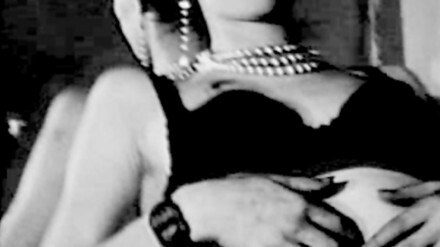Admissions start at $5
Get ticketsSeptember 17, 2024, 7pm
Brooklyn, NY 11205
USA
Join us at e-flux Screening Room on Tuesday, September 17 at 7pm for Unexpected Pleasures: Women, Punk, and Experimental Film, featuring films by a range of women artist filmmakers whose work was shaped by the punk era of the 1970s.
Just as punk created a space for bands such as The Slits and Poly Styrene to challenge 1970s norms of femininity through a transgressive, strident new female identity, it also provoked experimental feminist filmmakers to initiate a parallel, lens-based challenge to patriarchal modes of filmmaking.
The films in this screening were part of a rebellious, feminist punk audiovisual culture. In their filmmaking and their performed personae, film and video artists such as Peggy Ahwesh, Betzy Bromberg, Abigail Child, Vivienne Dick, Tessa Hughes-Freeland, Ruth Novaczek, and Anne Robinson (all of whom will be screened) offered a powerful, deliberately awkward alternative to hegemonic conformist femininity, creating a new punk audiovisual aesthetic. While not all of these artists identified as punks, the spirit of punk provoked experimental feminist filmmakers to initiate a parallel, lens-based challenge to patriarchal modes of filmmaking. A vital aspect of our vibrant contemporary digital audiovisual culture can be traced back to the techniques and forms of these pioneers, who, like their musical contemporaries, worked in a pre-digital, analog modality that nevertheless influenced the emergent digital audiovisual culture of the 1990s and 2000s.
This screening guest-curated by Rachel Garfield is a celebration of the book Experimental Film and Punk: Feminist Audiovisual Culture of the 1970s and 1980s (Bloomsbury, 2022) by Garfield, who will introduce the screening. There will be a discussion after the screening, with Peggy Ahwesh, Abigail Child, and Tessa Hughes-Freeland.
Films
Betzy Bromberg, Ciao Bella (Or Fuck Me Dead) (1978, 9 minutes)
A personal film about love and mortality. Ciao Bella is a summer-in-the-city travelogue that mixes verité footage of Lower East Side bikers, Times Square topless dancers, and Coney Island crowds to achieve a highly charged atmosphere of manic exhibitionism and sexual raunch. (J. Hoberman)
Tessa Hughes-Freeland, Baby Doll (1982, 3 minutes)
Baby Doll is a short documentary portrait of two topless dancers, Ferne and Irene. Shot in New York City in the early 1980s, the film captures them as they prepare for work, talking about their job, experiences, and patrons.
Abigail Child, Cake and Steak (2002-2004, 20 minutes)
The first part of a series of digital projections that excavate “girl training” in the legacy of home movie and post-war American suburban culture. The project is imagined as a digi-novel in chapters. The first part re-reads the American dream to question the American nuclear family.
Peggy Ahwesh, Doppelganger (1987, 8 minutes)
Doppelganger is a portrait of Peggy Ahwesh’s friend Renate, who was born in Berlin and spent her early childhood playing in the rubble after World War II. Renate tells stories and recites entries from her diary in both English and German, evoking history, trauma, and lost loves. The film is shot in long verité-like takes, in Super 8 sound, with several color hand-processed scenes.
Vivienne Dick, London Suite (Getting Sucked In) (1990, 28 minutes)
London’s cultural diversity unfolds as Vivienne Dick portrays her friends, their lifestyles, what they talk about, and how they talk. In this kaleidoscopic arrangement of encounters and re-enactments, equal weight is given to the passionate and the banal. The camera’s sudden hops from one reality to another and the disjointed conversations are drawn together by the musical score and the film’s internal rhythm.
Anne Robinson, Four Minute Cut (1987, 4 minutes)
Optically printed and refilmed footage of two women kissing: The camera circles them in open, green park space and then in the confines of a poorly lit basement interior. There is a sense of peril that intensifies these moments of love, and text on screen draws our attention to their eyes looking beyond, as they are “locked into a hold - a doubling of blond spiky hair.” (R. Garfield).
Ruth Novaczek, Episode (2003, 4 minutes)
Episode is an introverted rap of understated aphorisms. “…an illusion I’d wrought into a fragmented narrative of my own downfall, and when all was lost I had to face the realization of my own complicity,” intones the narrator of Episode. The film is a collage of dark Americana and despairing figures, smoking, throwing dice, overlaid with a relentless drum track. A meditation on memory, a displaced subject, mountains, bells, a melancholy gaze… an elegy for New York, Yiddish aphorisms, a hybrid gothic video diary.
For more information, contact program [at] e-flux.com.
Accessibility
– Two flights of stairs lead up to the building’s front entrance at 172 Classon Avenue.
– For elevator access, please RSVP to program@e-flux.com. The building has a freight elevator which leads into the e-flux office space. Entrance to the elevator is nearest to 180 Classon Ave (a garage door). We have a ramp for the steps within the space.
– e-flux has an ADA-compliant bathroom. There are no steps between the Screening Room and this bathroom.

